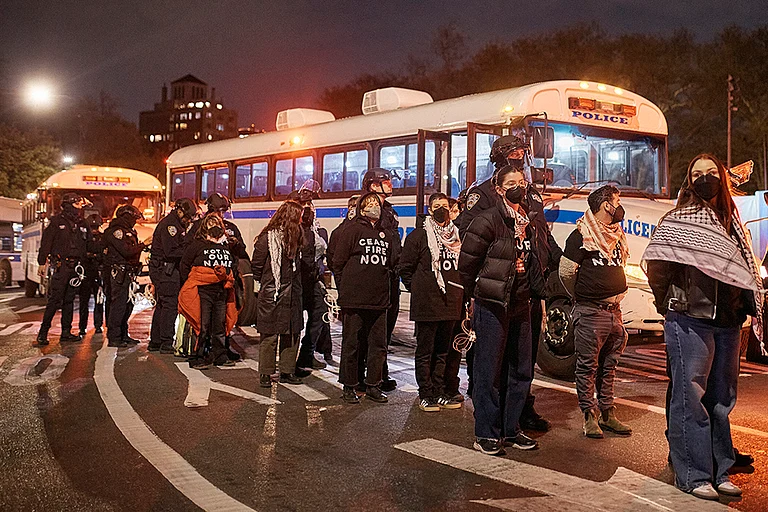A new wave of student protests joined the pro-Palestine movement over the past month. What started as encampments in US colleges, turned into widespread agitations across continents with protesting students urging their schools to call for an immediate ceasefire. The protests rose to prominence last month when hundreds of police personnel arrived at Columbia University to remove an encampment for solidarity with Gaza. Clashes had erupted late night as police, clad in helmets and equipped with zip ties and riot shields, gathered at the university’s entrance to curtail the protesters. Several protesters were apprehended and removed from campus via buses.
Rise Of The Pro-Palestine Student Agitation And Where It Stands
The inaction of the US government against Israel’s war on Gaza has angered pro-Palestinian activists and student protesters across many eminent schools

Similar police actions have also been reported at Brown University, Yale University, University of California and many other colleges across the world. More than 2,800 people have been arrested at 56 colleges and universities, according to the latest numbers by the Associated Press. However, the resistance has refused to die down.
Israel’s offensive has killed more than 35,000 people in Gaza, mostly women and children, according to Gaza's Health Ministry. Yet, the US has repeatedly denied it as a genocidal attack. Instead, President Joe Biden has been arming, funding and providing political and diplomatic support to Israel as collective punishment for the Hamas strike inside Israel on October 7.
In its latest attacks, the Netanyahu-led government has increased bombardment in Rafah, one of the main refuge zones for displaced Palestinians, while ordering the population to evacuate from parts of the city.
Demands of the students
The students are demanding that their institutes sever all financial and academic links with Israel. There are four overarching demands across varsities:
- Disclose their financial and professional ties with organisations “complicit in the ongoing ethnic cleansing of Palestine”
- Divest from organisations affiliated with Israel
- Reinvest in Palestinian students, academics, and scholars
- Protect students, faculty, and staff, especially “those targeted for their involvement in pro-Palestine action”
Rising Student Protests
The inaction of the US government against Israel’s war on Gaza has angered pro-Palestinian activists and student protesters across many eminent schools and the agitation, though simmered down over the past week, is still on. On May 12, dozens of the 7,000 graduates at Duke University left their seats to protest pro-Israel speaker and comedian Jerry Seinfeld during the commencement in Durham, North Carolina. Some waved the red, green, black and white Palestinian flag and chanted “Free Palestine” amid a mix of boos and cheers.
About 100 students and families of graduating students at Virginia Commonwealth University walked out on an address by Republican Governor Glenn Youngkin’s speech in support of Palestinians, while others held signs signalling opposition to Youngkin's policies on education, according to WRIC-TV. At the University of California, Berkeley, a graduation ceremony was halted when a small group of pro-Palestinian protesters waved flags and chanted slogans.
In the UK, the entrance to King’s College has been dotted with encampments by pro-Palestine protestors, many of them wearing keffiyehs and waving Palestinian flags. Similar encampments have also been set up at 10 UK colleges, including Cambridge, Oxford, Edinburgh, UCL, Newcastle and Leeds. UK Prime Minister Rishi Sunak and Education Secretary Gillian Keegan have also held crisis meetings with university vice-chancellors and Jewish students to discuss ‘de-escalation’ of the campus protests.
Confrontation With Admins
As confrontations between students and administrations became more frequent, campuses tried a range of strategies, from appeasement to threats of disciplinary action, to resolve the protests and clear the way for commencements. “This is only going to make us stronger. They can't arrest the movement," said Quinn Perian, an undergraduate student at Massachusetts Institute of Technology (MIT) and organiser for MIT Jews for Ceasefire.
In some cases, universities have agreed to divest from companies with links to Israel, while others have committed to disclosing such investments without committing to divesting.
Brown University in Rhode Island agreed last month that its highest governing body would vote on divestment from companies affiliated with Israel during its meeting slated for October. The University of Minnesota reached an agreement with students as it promised to provide the protesters with information on public companies it has invested in.
Protesters at Harvard Yard voluntarily took down their tents earlier this week after Harvard University officials agreed to discuss their questions about the academic endowment with regard to the pro-Palestinian protest.
In the UK, Goldsmith University has given protesting students an opportunity to present their “evidence of Goldsmiths’ complicity with Israel” to the institute’s finance committee and has agreed to a new ethical investment policy.
Advertisement
Meanwhile, some schools have also let protesters hold rallies and organise their encampments as they see fit. Wesleyan University, a liberal arts school in Connecticut, has commended the pro-Palestinian on-campus demonstration as an act of political expression. More than 100 tents are set up on the campus.
"The protesters' cause is important — bringing attention to the killing of innocent people,” university President Michael Roth wrote to the campus community. “And we continue to make space for them to do so, as long as that space is not disruptive to campus operations,” he said.
-
Previous Story
Massive Brawl In Turkish Parliament, Blood On Floor As MPs Engage In Fistfight
- Next Story





















